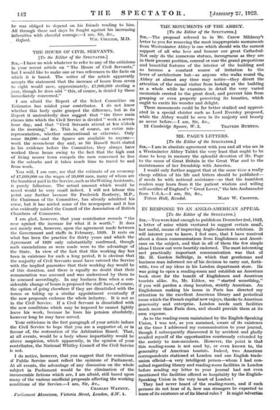THE HOURS OF CIVIL SERVANTS. [To the Editor of the
SPECTATOR.] SIR,—I have no wish whatever to refer to any of the criticisms in your recent article on " The Hours of Civil Servants," but I would like to make one or two references to the facts on which it is based. The writer of the article apparently accepts the statement that the increase of hours from seven to eight would save, approximately, £7,000,000 sterling a year, though he does add " this, of course, is denied by those immediately concerned."
I am afraid the Report of the Select Committee on Estimates has misled your contributor. I do not know whether this body quite grasped the difference, but in its Report it undoubtedly does suggest that " the three main classes into which the Civil Service is divided " work a seven-
hour day, and that " Civil Servants attend at ten o'clock in the morning," &c. This is, of course, an entire mis- representation, whether unintentional or otherwise. Only some 80,000—and the figures are available to anyone—
work the seven-hour day and, as Sir Russell Scott stated in his evidence before the Committee, they always have worked these hours owing to the fact that the high cost of living nearer town compels the men concerned to live in the suburbs and it takes much time to •travel to and from work.
You will, I am sure, see that the estimate of an economy of £7,000,000 on the wages of 30,000 men, many of whom are the humblest paid in the Service, such as theWriting Assistants, is purely fallacious. The actual amount which would be saved would be very small indeed. I will not labour this point any further because Sir Frederick Banbury, M.P., the Chairman of the Committee, has already admitted his error, but it has misled some of the newspapers and it has also evidently misled the Council of the Association of British Chambers of Commerce.
I am glad, however, that your contributor records " the case against the increase for what it is worth." It does not merely rest, however, upon the agreement made between the Government and staffs in February, 1920. It rests on what has been the practice for thirty years and which the Agreement of 1920 only substantially confirmed, though such emendations as were made were to the advantage of the State. In view of the fact that this working day has been in existence for such a long period, it is obvious that the majority of Civil Servants must have entered the Service with the implied guarantee that their working day would be of this duration, and there is equally no doubt that their remuneration was assessed and was understood by them to be assessed accordingly. In any business firm when a con- siderable change of hours is proposed the staff have, of course, the option of going elsewhere if they are dissatisfied with the terms or taking up a similar appointment eventually if the new proposals embrace the whole industry. It is not so in the Civil Service. If a Civil Servant is dissatisfied with the new conditions which may be imposed he cannot lightly leave his work, because he loses his pension absolutely, however long he may have served.
Your criticisms in the first paragraph of your article induce the Civil Service to hope that you are a supporter of, or in favour of, the restoration of the Arbitration Board. That, at all events, would be a body whose impartiality would be above suspicion, which apparently, in the opinion of your contributor, the National Whitley Council of the Civil Service is not.
I do notice, however, that you suggest that the conditions of Public Service must reflect the opinions of Parliament. At all events, the advantage of any discussion on the whole subject in Parliament would be the elimination of the innumerable fictions which are, I am afraid, still based upon many of the various unofficial proposals affecting the working conditions of the Service.—I am, Sir, &c., CFIAAT.Rq WATNEY.
Parliament Mansions, Victoria Street, London, S.W.1.










































 Previous page
Previous page